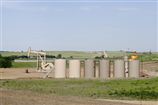Will Fracking Go Waterless?
By Sara Jerome
Waterless fracking methods may curb the environmental concerns being associated with the controversial drilling method.
Currently, fracking produces heavily contaminated wastewater. "A mixture of high-pressure water, sand, and chemicals (some of which are hazardous) is pumped into the layer of shale" to release the valuable natural gas, the Zanesville Times Recorder explained.
It is a water-intensive process, requiring as much as 6 million gallons of water per well, the report said. A single well can be fracked more than once.
The conundrum: On the other side of the fracking process, drilling companies with a wastewater problem.
"As much as 40 percent of this water and chemical mixture returns to the surface and must be disposed of safely. This water mixture can acquire more toxic substances and radioactivity while underground," the report said.
The process of handling the wastewater is tricky. "A common means of disposal is injection into state-approved deep disposal wells. This toxic brew is subject to spillage while in storage ponds awaiting transport and during transport," the report said.
But drilling companies are considering a new solution: What if they took water out of the equation altogether? The Recorder article advocated for waterless fracking, calling it a "revolutionary new process."
GasFrac is one company that uses such a process. It "has devised a liquefied petroleum gas, or LPG-based fracking method," Motley Fool reported.
"Water fracking substitutes propane for water. Being a natural component of oil and gas, propane mixes with the oil and gas in the well. Unlike water used in fracking, all of the propane returns to the surface to be reclaimed," the Recorder piece said.
Motley Fool laid out the pros and cons.
"Because the flowback doesn't need to be disposed of it creates less truck traffic that adds to the environmental advantages of the process. To top it off, the process also yields higher initial production rates, which creates a real, win-win solution for producers," it said.
But there is a down side. "That being said, the process does cost more money and with cost containment such a driver for companies that puts this process at an economic disadvantage with water," the report said.
Another waterless process replaces water with nitrogen, an option employed by the company Air Products.
This process "can provide both performance and cost advantages in certain formations over water-based fracking. The key though is nitrogen is only really practical in an ideal situation which is in shallower wells that can stay propped up without the use of proppants like sand as nitrogen is a poor proppant carrier," the Motley Fool said.
For more fracking coverage from Water Online, click here.
Image credit: "Orvis State oil well and gas tanks and natural gas flare - Evanson Place - Arnegard North Dakota - 2013-07-04," © 2013 Tim Evanson, used under an Attribution-ShareAlike 2.0 Generic license: http://creativecommons.org/licenses/by-sa/2.0/
Copyright © 1996 - 2014, VertMarkets, Inc. All rights reserved. To subscribe or visit go to: http://www.wateronline.com
http://www.wateronline.com/doc/will-fracking-go-waterless-0001
